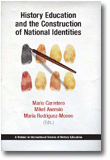
History Education and the Construction of National Identities
Edited by:
Mario Carretero, Universidad Autónoma de Madrid
Mikel Asensio, Universidad Autónoma de Madrid
María Rodríguez-Moneo, Universidad Autónoma de Madrid
A volume in the series: International Review of History Education. Editor(s): Arthur Chapman, University College London. Arie Wilschut, Amsterdam University of Professional Education. Stuart J. Foster, University of London.
Published 2013
How is history represented? As just a record of the past, as a part of a present identity or as future goals? This book explores how historical contents and narratives are presented in school textbooks and other cultural productions (museums, monuments, etc) and also how they are understood by students, in the context of increasing globalization. In these contemporary conditions, the relation between history learning processes, in and out of school, and the construction of national identities presents an ever more important topic. It is being studied by looking at the appropriation of historical narratives, which are frequently based on the official history of a nation state. Most of the chapters in this volume are educational studies about how the learning of history takes place in school settings of different countries such as Canada, France, Germany, Latin America, Spain, the Netherlands, the United Kingdom and the United States. Covering such a broad sample of cultural and national contexts, they provide a rich reflection on history as a subject related to patriotism, cosmopolitanism, both or neither.
CONTENTS
Series Introduction, Peter Lee. Acknowledgements. History Education and the Construction of a National Identity, Mario Carretero, Maria Rodriguez-Moneo, and Mikel Asensio. SECTION 1: THEORETICAL ISSUES. De-Nationalize History and What Have We Done? Ontology, Essentialism, and the Search for a Cosmopolitan Alternative, Jonathan M. Hansen. De-Nationalizing History Teaching and Nationalizing It Differently! Some Reflections On How to Defuse the Negative Potential of National(ist) History Teaching, Stefan Berger. Re-Thinking History Textbooks in a Globalised World, Stuart Foster. Commentary: What History to Teach? Whose History? Alberto Rosa. SECTION 2: PURPOSES OF HISTORY EDUCATION. Dilemmas of Common and Plural History: Refl ections on History Education and Heritage in a Globalizing World, Maria Grever. School History as a Resource for Constructing Identities: Implications of Research from the United States, Northern Ireland, and New Zealand, Keith C. Barton. A Traditional Frame for Global History: The Narrative of Modernity in French Secondary School, Nicole Tutiaux-Guillon. Indigenous Historical Consciousness: An Oxymoron or a Dialogue? Peter Seixas. Commentary: Identity Construction and the Goals of History Education, Cesar Lopez and Mario Carretero. SECTION 3: STUDENTS IDEAS AND IDENTITIES. Students Historical Narratives and Concepts About the Nation, Mario Carretero, Cesar Lopez, Maria Fernanda Gonzalez, and Maria Rodriguez-Moneo. Ways of Knowing and the History Classroom: Supporting Disciplinary Discussion and Reasoning About Texts, Avishag Reisman and Sam Wineburg. The Intersection of Historical Understanding and Ethical Refl ection During Early Adolescence: A Place Where Time is Squared, Michelle J. Bellino and Robert L. Selman. The Discursive Negotiation of Narratives and Identities in Learning History, Angela Bermúdez. Commentary: Student Identities in the Present and Their Historical Understanding of the Past: Complications and Implications for Future Research, Alan Stoskopf. SECTION 4: MUSEUMS AND IDENTITIES. Historical Narratives in the Colonial, National and Ethnic Museums of Argentina, Paraguay and Spain, Marisa González de Oleaga. From Identity Museums to Mentality Museums: Theoretical Basis for History Museums, Mikel Asensio. Commentary: What is the Purpose of a History Museum in the Early 21st Century? Veronica Boix Mansilla. SECTION 5: COLLECTIVE MEMORIES AND REPRESENTATIONS OF PAST AND FUTURE. Are Family Recollections an Obstacle to History Education? How German Students Make Sense of the East German Dictatorship, Sabine Moller. History as a Dynamic Process: Reanalysing a Case of Anglo-Japanese Reconciliation, Kyoko Murakami. The Future Shapes the Present: Scenarios, Metaphors and Civic Action, Helen Haste and Amy Hogan. Monuments in Our Minds: Historical Symbols as Cultural Tools, Jaan Valsiner. Commentary: The Complex Construction of Identity Representations and the Future of History Education, Floor van Alphen and Mikel Asensio.
-
Paperback978-1-61735-935-4
Web price: $44.91 (Reg. 52.84)
-
Hardcover978-1-61735-936-1
Web price: $84.01 (Reg. 98.84)
- eBook978-1-61735-937-8

- EDU037000 - EDUCATION: Research
- EDU032000 - EDUCATION: Leadership
- HIS035000 - HISTORY: Study and Teaching
-
 (Re)Envisioning Social Studies Education Research
Current Epistemological and Methodological Expansions, Deconstructions, and Creations
(Re)Envisioning Social Studies Education Research
Current Epistemological and Methodological Expansions, Deconstructions, and Creations
-
 Contemporary Public Debates Over History Education
Contemporary Public Debates Over History Education
-
 History Education and Historical Inquiry
History Education and Historical Inquiry
-
 Joined-up History
New Directions in History Education Research
Joined-up History
New Directions in History Education Research
-
 National History Standards
The Problem of the Canon and the Future of Teaching History
National History Standards
The Problem of the Canon and the Future of Teaching History
-
 The Colonial Past in History Textbooks
Historical and Social Psychological Perspectives
The Colonial Past in History Textbooks
Historical and Social Psychological Perspectives
-
 The Handbook for Aspiring Higher Education Leaders
The Handbook for Aspiring Higher Education Leaders

